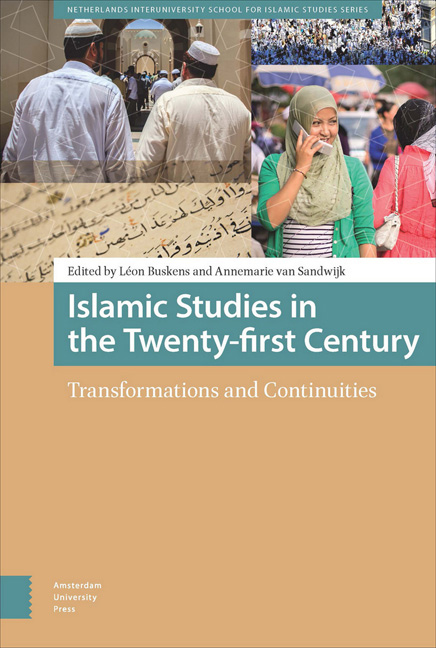Book contents
- Frontmatter
- Dedication
- Contents
- Preface
- Introduction: Dichotomies, Transformations, and Continuities in the Study of Islam
- Islamic Texts: The Anthropologist as Reader
- Textual Aspects of Religious Authority in Premodern Islam
- What to Do with Ritual Texts: Islamic Fiqh Texts and the Study of Islamic Ritual
- Textual Study of Gender
- Scholarship on Gender Politics in the Muslim World: Some Critical Reflections
- Power, Orthodoxy, and Salvation in Classical Islamic Theology
- Dialectical Theology in the Search for Modern Islam
- “Classical” Islamic Legal Theory as Ideology: Nasr Abu Zayd’s Study of al-Shafiʿi’s al-Risala
- Islamic Law in the Modern World: States, Laws, and Constitutions
- Vernacular Cosmopolitanism as an Ethical Disposition: Sufi Networks, Hospitality, and Translocal Inclusivity
- Middle Eastern Studies and Islam: Oscillations and Tensions in an Old Relationship
- Notes on Contributors
- Overview of NISIS Autumn Schools, 2010-2014
- Index
“Classical” Islamic Legal Theory as Ideology: Nasr Abu Zayd’s Study of al-Shafiʿi’s al-Risala
Published online by Cambridge University Press: 12 December 2020
- Frontmatter
- Dedication
- Contents
- Preface
- Introduction: Dichotomies, Transformations, and Continuities in the Study of Islam
- Islamic Texts: The Anthropologist as Reader
- Textual Aspects of Religious Authority in Premodern Islam
- What to Do with Ritual Texts: Islamic Fiqh Texts and the Study of Islamic Ritual
- Textual Study of Gender
- Scholarship on Gender Politics in the Muslim World: Some Critical Reflections
- Power, Orthodoxy, and Salvation in Classical Islamic Theology
- Dialectical Theology in the Search for Modern Islam
- “Classical” Islamic Legal Theory as Ideology: Nasr Abu Zayd’s Study of al-Shafiʿi’s al-Risala
- Islamic Law in the Modern World: States, Laws, and Constitutions
- Vernacular Cosmopolitanism as an Ethical Disposition: Sufi Networks, Hospitality, and Translocal Inclusivity
- Middle Eastern Studies and Islam: Oscillations and Tensions in an Old Relationship
- Notes on Contributors
- Overview of NISIS Autumn Schools, 2010-2014
- Index
Summary
Introduction
Joseph Schacht opened his classical work on Islamic law in 1950 with the following statement:
The classical theory of Muhammadan law, as developed by the Muhammadan jurisprudents, traces the whole of the legal system to four principles or sources: the Koran, the sunna of the Prophet, that is, his model behaviour, the consensus of the orthodox community, and the method of analogy. The essentials of this theory were created by Shāfi‘ī … [H]e carried it to a degree of competence and mastery which had not been achieved before and was hardly equalled and never surpassed after him. (Schacht 1959, 1)
Obviously, classical theory to Schacht meant Muhammad b. Idris al-Shafiʿi’s (d. 820) theory about the system of four sources, due to his basic interest in the history of legal hadith. He considered it classical, apparently, because to him this theory is unequalled and unsurpassable in mastery and competence. Before exploring whether the central point in al-Shafiʿi's theory was defining the four sources, let me first consider the significance of Schacht’s characterisation of al-Shafiʿi's theory as “classical.” It is pertinent to note that the term “classical” generally refers to Greek and Roman traditions alluding with admiration to perfection, completeness, and beauty in these cultures. Lately, it has also been used to distinguish between modern and ancient cultures and civilisations; antiquity is not necessarily used in a negative sense. However, one is not sure whether Schacht uses the term in the sense of admiration, because in an article about Islamic law written almost within a decade of the book cited above, he employed the term “classicism” as a synonym for fossilisation, decline, and immobility (Schacht 1957, 141). Furthermore, with reference to Islamic law, the attribute “classical” in modern settings may also mean that it is not adaptable to modern needs because in this theory Islamic law is religious and sacred in its source. This perception of classical was probably born in the wake of colonial modernism that defined non-Western cultures, especially legal traditions, in terms of decadence. Those cultures were declining and could not be reformed; they could only be replaced with modern and more advanced legal systems.
- Type
- Chapter
- Information
- Islamic Studies in the Twenty-first CenturyTransformations and Continuities, pp. 183 - 204Publisher: Amsterdam University PressPrint publication year: 2017



